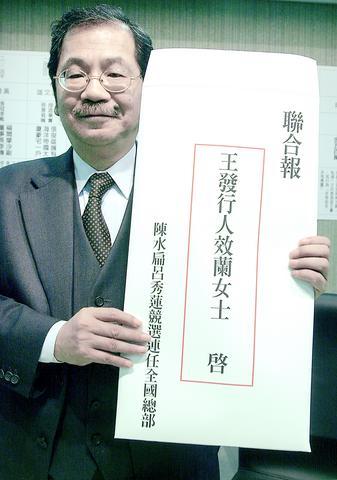The Democratic Progressive Party (DPP) yesterday accused the United Daily News (UDN) of tarnishing the reputation of President Chen Shui-bian (
Wu Nai-jen (
"The United Daily News published three stories, unverified and unattributed, on Feb. 6, 8 and 11 accusing the DPP government of involvement in a bribery scandal," Wu said. "But the stories do not have any specific evidence."

PHOTO: CHIEN JUNG-FENG, TAIPEI TIMES
"These stories not only mislead the public and hurt the president's honor, but also endanger the reputation of the United Daily News," he said.
Wu said the stories are in violation of Article 92 of the Election and Impeachment Law, which regulates spreading rumors in an attempt to affect the outcome of an election.
He called the media's performance during this presidential election campaign the worst in more than 20 years.
Wu said the intention of the United Daily News to sway the election has damaged the credibility of the media, and the DPP hopes the letter will prompt the newspaper to improve.
He cited an editorial in the United Daily News on its 47th anniversary that upheld "anti-communism, democracy, unification and progress" as its principles, but said the newspaper has violated its own principles and ethos.
Wu said the DPP could no longer put up with such irresponsible reports and that it decided to fight back against the paper.
"We will start with a rational appeal, but we haven't decided yet whether to take legal action against the United Daily News."
"Article 92 not only refers to civil issues but also may lead to imprisonment for five years," Wu said. "If the United Daily News fails to make an improvement, we will resort to legal procedures."
Responding to Wu's remarks, the paper issued a statement saying, "The United Daily News deals with stories according to journalistic professionalism and journalistic ethics."
It called on candidates to respect the media's role in society.
Meanwhile, the DPP's campaign headquarters said the pan-blue camp was using campaign tricks that have been condemned in other democratic countries.
"The first kind of blue-camp negative campaign trick is to make up facts and then implicate an opponent," Wu said, "like when former legislator Lin Ruey-tou (林瑞圖) claimed that Chen Shui-bian had gone to Macau for a wench in 1998.
"The second one is to create a sensational story for slandering. This includes when People First Party [PFP] Legislator Chiu Yi (
"The third is to viciously impute blame to another, such as when PFP Legislator Diane Lee (李慶安) accused former Department of Health head Twu Shiing-jer (涂醒哲) of being involved in a sexual harassment case in October 2002. She later apologized for accusing the wrong person," Wu said.
"The last kind is to spread slanderous rumors with groundless talk, such as PFP Chairman James Soong (
Wu said the blue camp's ridiculous rumors have developed to an evil degree and are even encouraged by the blue camp's vice presidential candidate, Soong.
"We hope the media do not serve as those evil tricks' accomplice," he said.

The Ministry of the Interior (MOI) is to tighten rules for candidates running for public office, requiring them to declare that they do not hold a Chinese household registration or passport, and that they possess no other foreign citizenship. The requirement was set out in a draft amendment to the Enforcement Rules of the Public Officials Election and Recall Act (公職人員選舉罷免法 ) released by the ministry on Thursday. Under the proposal, candidates would need to make the declaration when submitting their registration forms, which would be published in the official election bulletin. The move follows the removal of several elected officials who were

The Republic of China (ROC) is celebrating its 114th Double Ten National Day today, featuring military parades and a variety of performances and speeches in front of the Presidential Office in Taipei. The Taiwan Taiko Association opened the celebrations with a 100-drummer performance, including young percussionists. As per tradition, an air force Mirage 2000 fighter jet flew over the Presidential Office as a part of the performance. The Honor Guards of the ROC and its marching band also heralded in a military parade. Students from Taichung's Shin Min High School then followed with a colorful performance using floral imagery to represent Taiwan's alternate name

FOUR DESIGNATED AREAS: Notices were issued for live-fire exercises in waters south and northwest of Penghu, northeast of Keelung and west of Kaohsiung, they said The military is planning three major annual exercises across the army, navy and air force this month, with the navy’s “Hai Chiang” (海強, “Sea Strong”) drills running from today through Thursday, the Ministry of National Defense said yesterday. The Hai Chiang exercise, which is to take place in waters surrounding Taiwan, would feature P-3C Orion maritime patrol aircraft and S-70C anti-submarine helicopters, the ministry said, adding that the drills aim to bolster the nation’s offshore defensive capabilities. China has intensified military and psychological pressure against Taiwan, repeatedly sending warplanes and vessels into areas near the nation’s air defense identification zone and across

A Chinese takeover of Taiwan would severely threaten the national security of the US, Japan, the Philippines and other nations, while global economic losses could reach US$10 trillion, National Security Council Deputy Secretary-General Lin Fei-fan (林飛帆) wrote in an article published yesterday in Foreign Affairs. “The future of Taiwan is not merely a regional concern; it is a test of whether the international order can withstand the pressure of authoritarian expansionism,” Lin wrote in the article titled “Taiwan’s Plan for Peace Through Strength — How Investments in Resilience Can Deter Beijing.” Chinese President Xi Jinping’s (習近平) intent to take Taiwan by force